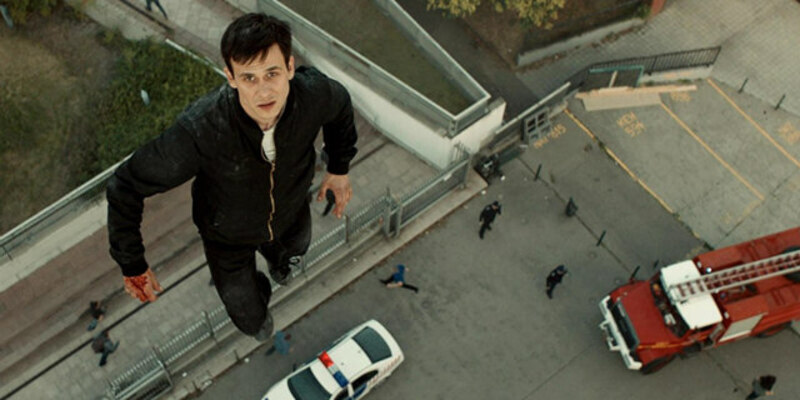An unscrupulous doctor discovers a Syrian immigrant with the ability to
fly.
Directed by: Kornel Mundruczo
Starring: Merab Ninidze, Zsombor Jeger, Gyorgy Cserhalmi,
Monika Balsai
Hungarian director Kornel Mundruczo's 2014 feature White God was one of the most audacious films of many a year. The audacity continues in Jupiter's Moon, one of the most visually impressive movies to come out of Europe in
recent years. It tells the fantastical story of Aryan (Zsombor Jeger), a Syrian immigrant shot dead by Laszlo (Gyorgy Cserhalmi), a
ruthless immigration officer. Rather than stay dead however, Aryan's body,
along with his spilled blood, begins to levitate high into the Hungarian sky
as he miraculously comes back to life.
Aryan is discovered by Gabor (Merab Ninidze), an unscrupulous doctor
who moonlights in a refugee camp, having been disgraced following a botched
operation that resulted in a patient's death. The parents of the dead man
have filed a lawsuit against Gabor, who has been accumulating money through
various illegal means in an attempt to pay them off and restore his good
name. Gabor decides to cash in on Aryan's supernatural ability, taking him
along on his rounds and passing him off to beguiled terminal patients as an
angel. Believing Aryan has cured them with his other-worldly demonstrations,
they reward Gabor handsomely, but news of the young flying Syrian soon
reaches Laszlo, and Gabor and Aryan find themselves on the run.
As with White God, Mundruczo exploits Budapest here in a manner that makes you wonder if he
doesn't have some dirt on its mayor. There are scenes in
Jupiter's Moon that require multiple city blocks to be shut
down, none more so than a subjective POV car chase filmed in one long take
that hurtles us through the streets of the Hungarian capital.
Movies are often likened to rollercoaster rides, and that's certainly a
fitting metaphor for Jupiter's Moon. Mundruczo and cinematographer Marcell Rev take us on a dizzying
tour of Budapest's city centre, the camera ducking in and out of cars,
shops, restaurants, down into subways and beneath rivers and up, up, up into
the air as it follows the levitating Aryan. In one jaw-dropping set-piece,
Aryan literally turns a skinhead's world upside down, rotating his apartment
in a manner that defies the laws of physics. Committed to extended takes
that make you tired simply contemplating the work that must have been put
into them, Jupiter's Moon is reminiscent of the work of
Alfonso Cuaron and Alejandro Inarritu, but the urban locale makes it all the
more impressive.
The FX work here is flawless, putting most mega-budget blockbusters to
shame. With European cinema you can often see the strings when it comes to
digitally aided sequences, but it's impossible to tell where reality ends
and the greenscreen begins here. You really will believe this boy can
fly!
While it's an exciting chase thriller, thematically Jupiter's Moon
can play as shallow and confused. Mundruczo throws several themes at us -
religion, xenophobia, Europe's refugee crisis, guilt - but never quite
explores any of them with any real depth, suggesting he may not really have
that much to say about any of them, and has simply co-opted a very real
crisis to give his film some poignancy.
Perhaps we expect too much from European cinema. If
Jupiter's Moon were a product of Hollywood rather than
Hungary, would its superficiality be called into question, or would we
simply sit back and enjoy the ride? I suspect the latter. Mundruczo is by no
means the new Tarkovsky or Bergman, but he is a unique presence in today's
European cinema. He may be concerned with form more than content, but when
the form is this dazzling, it's worth celebrating.
Jupiter's Moon is on MUBI UK
now.






